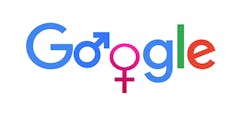Anti-Social Engineering: Tech's New Diversity Dilemma
Righteousness and big business rarely, if ever, work well together. It's the classic struggle of doing what's right for your conscience or what's best for the corporation. James Damore had to learn that the hard way.
Last Friday some Google coworkers leaked the now infamous software engineer's controversial mission statement about fairness and diversity he wrote in a moment of inspiration (or boredom) while flying over the Pacific to China. He hoped the treatise would catalyze dialogue at Google and bring about a more egalitarian workplace where everyone felt welcome.
Download Damore's memo HERE.
The memo, (sent internally on Google+ in July), went viral over the weekend, enthralling the tech community with polarizing notions of moral biases and Google's progressive workplace being an "ideological echo chamber."
By Monday, he was fired for it. It was his Jerry Maguire moment.
He took a stand and was asked to keep on walking. Maybe they at least let him leave with a goldfish. It's doubtful any women followed him out to start his own search engine company like in the classic rom-com, as the cause for his termination was perpetuating gender stereotypes.
Whether he did or didn't deserve to be fired is irrelevant. After all, California is an "at will" state, and he can be fired for any ol' reason, like still having an AOL email address.
And federally, the first amendment only protects people from the government, not $500 billion companies that control the Internet. It should be noted that Damore did file a lawsuit for unlawful termination, because he had filed a complaint with the National Labor Relations Board. Business Insider reports his case does have a chance, though.
But that's all barely a drizzle compared to the tempest his manifesto manifested, or to put it more bluntly, the s***storm that will reverberate from the high tech startups in the Bay Area to 100-year-old machine shops in Des Moines.
While the letter was written to Damore's fellow employees at Alphabet Headquarters in Mountain View, Calif., and is strictly about Google's policies, we think it speaks to everyone with a STEM career.
That's why we thought it was necessary to cover this here. We want to equip you, our readers, with the best tools to do your job and manage your plants and people. The tools we have for you today are truth and reason, because there's a fine line between sensitivity and sensibility, and you need to know how to measure it.
Damore didn't.
Obviously, he wanted to weigh in on a serious subject, treating women in tech jobs fairly. Currently, 60 women may join a class-action lawsuit against Google for sexism and for gender pay disparity. As an engineer, maybe he thought he could fix things.
He couldn't.
Walking the Dogma
James Damore is not a misogynist— and he's not a hero. He's the guy who faced Goliath before David.
If you have read all 3,300 words, dismissing this paper—and its author—for "perpetuating gender stereotypes" seems beneath a company that created a portal to all the world's information and claims to encourage diversity of thought. And if anything, this paper is thought-provoking.
The author's main point isn't attacking diversity or women, but questioning Google's dogmatic approach to achieving a diverse workplace, rather than one based on merit.
Damore writes:
"I hope it's clear that I'm not saying that diversity is bad, that Google or society is 100% fair, that we shouldn't try to correct for existing biases, or that minorities have the same experience of those in the majority. My larger point is that we have an intolerance for ideas and evidence that don't fit a certain ideology. I'm also not saying that we should restrict people to certain gender roles; I'm advocating for quite the opposite: treat people as individuals, not as just another member of their group (tribalism)."
Discrimination has no place in any form anywhere, and Damore acknowledges this. This is mentioned several times in the memo and in subsequent interviews. But that's not the message conveyed to the public.
Gizmodo, which first posted the leaked letter, used the headline "Exclusive: Here's The Full 10-Page Anti-Diversity Screed Circulating Internally at Google."
"Screed" implies it's a tedious piece of writing; "anti-diversity" is a progressive cypher for neo-Nazi. That's in the headline of the first story on the subject.
Its good intentions run deep and there are many instances where he offers solutions to start a conversation, but you can tell this was written on a flight to China. Some statements come off as tone-deaf at best.
How to Lose a Girl in 10 Pages
Damore severely damages his argument with various cringe-worthy passages to explain why women aren't more represented in STEM fields. This much is true: American women account for more than 57% of professional jobs, but only held a quarter of the computing jobs in 2015, according to the National Center for Women & Information Technology.
There is some disconnect, and the engineer has to find a reason why.
Damore's evolutionary science-backed explanations led him to conclude that on average, women are more emotional and artistic and men more spatially aware and analytical. Not exactly ground-breaking theories, but it's a banal generalization for women who presumably have at least a four-year degree in science or math in order to even be considered by Google.
Here's an equivalent statement. On average, men are typically stronger than women. Look at the upper body musculature of 100 random men compared to 100 random women. Despite this evidence, Ronda Rousey will still kick your ass. And there are certainly some Ronda Rouseys of coding working in Silicon Valley.
But here's what definitely got him in trouble:
"Women on average are more prone to anxiety... This may contribute to the higher levels of anxiety women report on Googlegeist [Google's annual survey] and to the lower number of women in high stress jobs."
He also previously related women's "agreeableness" keeps them from asking for raises and becoming leaders.
Damore, who has a Master's degree in systems biology, clearly doesn't know much about women, or people in general. The easiest way to get someone to dismiss your whole argument is by offending them. That's just common sense. And telling women they aren't as successful as men because they are too agreeable or can't handle stress well is accidental trolling of the highest degree.
Yes, sometimes women are stressed. And sometimes men are, too. Whether or not someone admits to having stress on Google's annual survey is not sufficient scientific data to make a general claim for an entire gender. And even if you could prove women at Google were more stressed, you haven't proven causality.
Is the high level of stress due to women trying to prove to male engineers such as Damore that they are equals? And if the workplace is truly hostile to women, wouldn't they then be more likely to have more stress? And doesn't that then justify Google's borderline fanatical adherence to fostering what they deem an inclusive environment?
Maybe. Maybe not. Even if Damore is flat out wrong, nothing he said was malicious or trying to keep women down. This could have been a teachable moment where Google had him debate a female engineer and make it a team-building event, where everyone has frozen margaritas at the end. Build a dialogue, don't destroy a career.
When Bobby Riggs said female tennis players were inferior, he wasn't exiled. Billie Jean King played and beat him.
What better way to encourage girls to pursue all those STEM jobs the industry has been screaming it needs filled than by giving them a heroine to smite the chauvinistic douchery of Silicon Valley to bring forth a new age of innovation.
Kill the Messenger
Instead of a debate about the issues that could actually create some productive solutions, Damore's character was assassinated.
WIRED, for some reason, decided to publish a piece recalling a skit Damore was involved in while at Harvard for post-grad work. During a retreat he made a lewd reference to his professor's discovery of "microtubule jerking." The story acknowledges the skits are supposed to make fun of professors.
But WIRED needed to get to the bottom of Jerkgate. So they interviewed at least three people who were in attendance.
"The delivery was just awful," an anonymous student told WIRED. "It's a room full of scientists so there's a lot of awkwardness, but this was especially awkward. Maybe told in a different way it would have been received as a joke."
No word if they found out about the time he sang "Jack & Diane" at karaoke and was totally off key for, like, the whole song.
But they did find another anonymous source to reveal, "He was clearly socially maladjusted." On the bright side, this source did not believe Damore is "some sort of raving sexist or bigot."
All Damore had to do was focus on what seems to be purposely buried under accusations of mansplaining and pseudoscience.
Right Is Wrong
Pitting men vs. women is a tale as old as the Garden of Eden, and that's what people are mostly taking away from this kerfuffle. Hopefully, it creates real talk between managers and executives on how to create an equilibrium between welcoming diverse recruits and allowing their upward mobility while treating veteran workers with the respect they have earned. Again, this should be common sense.
But what can easily be overlooked is how moral biases are just as important to consider in the workplace, Damore argues.
He alleges that Google does in fact discriminate against an unlikely demographic. And it was brought to light unintentionally through the diversity training meant to promote a balanced workforce and hive mind of equality.
"In highly progressive environments, conservatives are a minority that feel like they need to stay in the closet to avoid open hostility. We should empower those with different ideologies to be able to express themselves."
Although Donald Trump is president and the Republicans have the House, Senate and a majority of governor seats, California isn't as welcoming to conservative ideals. Trump received 21% of votes in Santa Clara County, where Alphabet's Mountain View HQ is located.
Damore accuses Google's culture, which he calls an "idealogical echo chamber," of silencing and shaming those who hold opposing political viewpoints, creating an authoritarian environment.
"We're told by senior leadership that what we're doing is both the morally and economically correct thing to do, but without evidence this is just veiled left ideology that can irreparably harm Google."
It should be noted that Damore identifies as a "classical liberal," but he sees the political paradigm as a necessary yin and yang for a healthy business.
Figuring out how to achieve that balance and get conservatives and liberals to respect each other, no matter who is in the majority, could solve a lot of the other problems in the workplace and the country overall.
"Neither side is 100% correct and both viewpoints are necessary for a functioning society or, in this case, company. A company too far to the right may be slow to react, overly hierarchical, and untrusting of others. In contrast, a company too far to the left will constantly be changing (deprecating much loved services), over diversify its interests (ignoring or being ashamed of its core business), and overly trust its employees and competitors."
This is a pretty brave, passionate act, telling Google it's on a path of self-destruction. It's like the engineer who programmed the Death Star's toilets emailing Darth Vader about how to deal with the Rebels in a kinder, gentler way, and hitting "reply all."
Maybe he's kind of a misogynist and kind of a hero. Whatever you feel, we can at least all agree on one thing: Writing this took balls.
About the Author
John Hitch
Editor, Fleet Maintenance
John Hitch, based out of Cleveland, Ohio, is the editor of Fleet Maintenance, a B2B magazine that addresses the service needs for all commercial vehicle makes and models (Classes 1-8), ranging from shop management strategies to the latest tools to enhance uptime.
He previously wrote about equipment and fleet operations and management for FleetOwner, and prior to that, manufacturing and advanced technology for IndustryWeek and New Equipment Digest. He is an award-winning journalist and former sonar technician aboard a nuclear-powered submarine where he served honorably aboard the fast-attack submarine USS Oklahoma City (SSN-723).




